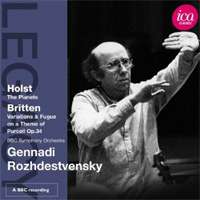|
Back
02/16/2012
Gustav Holst: The Planets, Op. 32
Benjamin Britten: Variations and Fugue on a Theme of Purcell, Op. 34
Ladies of the BBC Symphony Chorus, BBC Symphony Orchestra, Gennadi Rozhdestvensky (conductor)
Recorded at Royal Festival Hall, London (March 1980) [Holst] & Festival Hall, Osaka, Japan (June 1981) [Britten] – 68'07
ICA Classics ICAC 5053 – Booklet in English, French, German

This is an oddly alluring recording, warts and all. And there are plenty of warts. Gennadi Rozhdestvensky, always an intriguing interpreter, coaxes a pseudo-Russian sound from the BBC Symphony Orchestra in both of these colorful British masterpieces. Brass are strident and forwardly placed, with thin sound rather than rich warmth. Woodwinds, especially oboe and clarinet, play with quick, wide vibrato. Strings are fiendishly accurate in quick passagework and present but somewhat thin during the big melodies. If nothing else, there is a very different surface sheen to the orchestra than one finds in, say, Andrew Davis' recordings of these two pieces with the same orchestra, made in the early 1990s.
The performances swing wildly from straightforward renderings to off-the-wall caricatures. A good example is "Jupiter," which starts out far too slowly. The grand middle theme is marked by Holst to be half tempo of the preceding section, but sounds more l'istesso tempo here, albeit beautiful sculpted. At the return of the fast music, Rozhdestvensky picks up the pace quite a bit, to a more "traditional" Allegro giocoso pace. Here and in the other "loud" movements, heavy brass are quite close in the mix, generating a lot of excitement but also drawing extra attention to the many hiccups, especially from the principal trumpet.
The Britten offers a similar interpretive stance. There are some odd tempo choices, and the poor piccolo player is clearly caught off guard at the beginning of the fugue, which Rozhdestvensky kicks off at quite a clip, quickly tripping up many of the woodwind players. The fugue eventually settles down a bit in tempo, leading to a magisterial restatement of Purcell's theme under the chattering counterpoint. Again, there is much distinction in the woodwind solo movements--syrupy oboe, plasticine clarinet. The horn fanfares are oddly distant, even during their crescendo, while the all of the string variations are delightfully played, with rhythmic accuracy that recalls Mravinsky's Leningrad orchestra at its peak.
The two different venues offer slight changes in ambience. The Britten has more definition, the Holst more resonance, and this suits both works nicely. The hush of "Neptune" is effectively captured, and the climaxes of both works have bloom and clarity. Facing such stiff competition in the catalog in both these pieces, this recording can't offer a clear first choice, but for those interested in this conductor, intriguing interpretations of standard warhorses, or a good example of 1980s orchestral idiosyncrasies, it is a fascinating document.
Marcus Karl Maroney
|